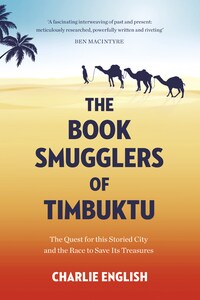William Collins
An imprint of HarperCollinsPublishers
1 London Bridge Street
London SE1 9GF
www.WilliamCollinsBooks.com
This eBook first published in Great Britain by William Collins in 2017
Copyright © 2017 by Charlie English
Maps by Meighan Cavanaugh
Frontispiece: Nineteenth-century drawing of Timbuktu, based on a description by the French explorer René Caillié
Charlie English asserts the moral right to be identified as the author of this work
A catalogue record for this book is available from the British Library
While the author has made every effort to provide accurate Internet addresses at the time of publication, neither the publisher nor the author assumes any responsibility for errors, or for changes that occur after publication. Further, the publisher does not have any control over and does not assume any responsibility for author or third-party websites or their content.
All rights reserved under International and Pan-American Copyright Conventions. By payment of the required fees, you have been granted the non-exclusive, non-transferable right to access and read the text of this e-book on-screen. No part of this text may be reproduced, transmitted, down-loaded, decompiled, reverse engineered, or stored in or introduced into any information storage and retrieval system, in any form or by any means, whether electronic or mechanical, now known or hereinafter invented, without the express written permission of HarperCollins
Source ISBN: 9780008126650
Ebook Edition © May 2018 ISBN: 9780008126643
Version: 2018-05-01
In among the millions of documents held by the British government’s National Archives is a slim dossier known as CO 2/20. The volume is not much requested. These archives, after all, hold papers that cover a thousand years of British history, and most visitors to the airy reading rooms at Kew come in search of more obvious treasures: Domesday Book, Shakespeare’s will, or the newly opened files of cold war traitors and spies. Every couple of years, however, someone will demand Colonial Office file 2/20, and a message will be passed to the Cheshire town of Winsford, where the dossier is held in a storage facility deep within Britain’s largest salt mine. There, an employee will venture into the arid darkness, pluck the file from more than twenty-two miles of shelving given over to the National Archives, and dispatch it south.
The box that arrives days later at the reading room is made of thick cardboard and bound with white cotton tape. Inside is a sheaf of a hundred or so handwritten communications—manuscripts, we might say—that were sent from the British consul in Tripoli to London in the mid-1820s. Each piece of ragged, well-traveled paper illuminates a small corner of time and place, and a handful have special relevance for our story. These are the last letters of a neglected explorer, Alexander Gordon Laing, and encompass the period of his expedition to discover the “far famed Capital of Central Africa,” as he described the city of Timbuktu.
Laing, a muttonchopped army major from Edinburgh, was fated to become the first European explorer to reach this elusive place. In the 1820s, Timbuktu dominated Europe’s ideas about Africa as El Dorado had once colored its concept of the Americas. Timbuktu was believed to govern a rich sub-Saharan region called the Sudan, after the Arabic Bilad al-Sudan, “the land of the blacks.” Rumors of the city’s existence had circulated in Europe for hundreds of years, and its riches had been trumpeted since at least the fourteenth century. As Marco Polo’s Zipangu was said to be a land where the king’s palace was roofed with precious metal, Timbuktu’s houses too were reported to be covered with gold. Scores of travelers had been sent to find it, but every attempt had ended in death or failure.
In 1826, it was the turn of Major Laing. Laing was a particular British sort, a product of that time between Waterloo and the Charge of the Light Brigade when military men sought death or glory, or a combination of the two. With his good looks and self-absorption, he could have slipped out of the pages of Vanity Fair. “I shall do more than has ever been done before,” he wrote, “and shall show myself to be what I have ever considered myself, a man of enterprise and genius.”








